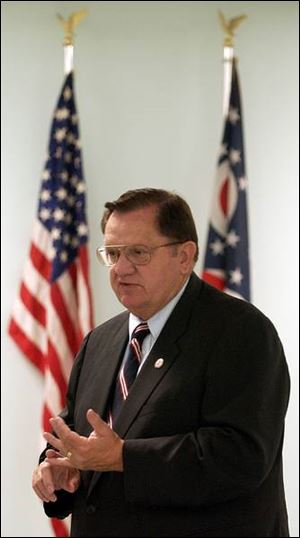
Sex-offender bill pushed by Gillmor
3/8/2006
Rep. Paul Gillmor (R., Old Fort) wants a task force to recommend a national system.
Tracking sex offenders from state to state soon may get a bit easier - as will knowing just how dangerous they are - according to Congressman Paul Gillmor.
The U.S. House of Representatives is considering a bill that would set up a database listing the nation's sex offenders and, ideally, their whereabouts.
The U.S. Department of Justice currently runs a Web site, www.nsopr.gov, that acts as a search engine of various state's registries, but a national database would list all offenders on one system.
Moreover, Congressman Gillmor (R., Old Fort) wants to make labels for those offenders consistent from state to state.
Consider the differences between Ohio and Michigan.
In Ohio, some offenders must register once every 90 days for life; others, once a year for a decade, depending on the severity of their crimes and the likelihood that they'll reoffend. Offenders deemed the most dangerous are considered "predators."
In contrast, Michigan sex offenders are not labeled differently, though they may have to register either for 25 years or for life, Shanon Akans, a spokesman for the Michigan State Police, said.
So what happens if an offender moves across state lines?
Fitting an out-of-state offender into Ohio categories is far from an exact science, said Lt. Greg Wojciechowski, who oversees the program for the Lucas County Sheriff's Office.
A 34-year-old man is listed as a Lucas County juvenile sex offender because, as a teenager, he assaulted a child elsewhere. Listing the man as a "juvenile offender" seemed awkward, but Ohio law also didn't address the inconsistency, the lieutenant said.
Mr. Gillmor's bill would set up a national task force of 20 members who would study the problems of the patchwork system and recommend a national version.
Whatever the outcome, Mr. Gillmor said the system should differentiate types of offenders based on their perceived danger to the community.
"I would say sex with an underage person is one type of offense, but it's different than kidnapping, rape, and murder," he said.